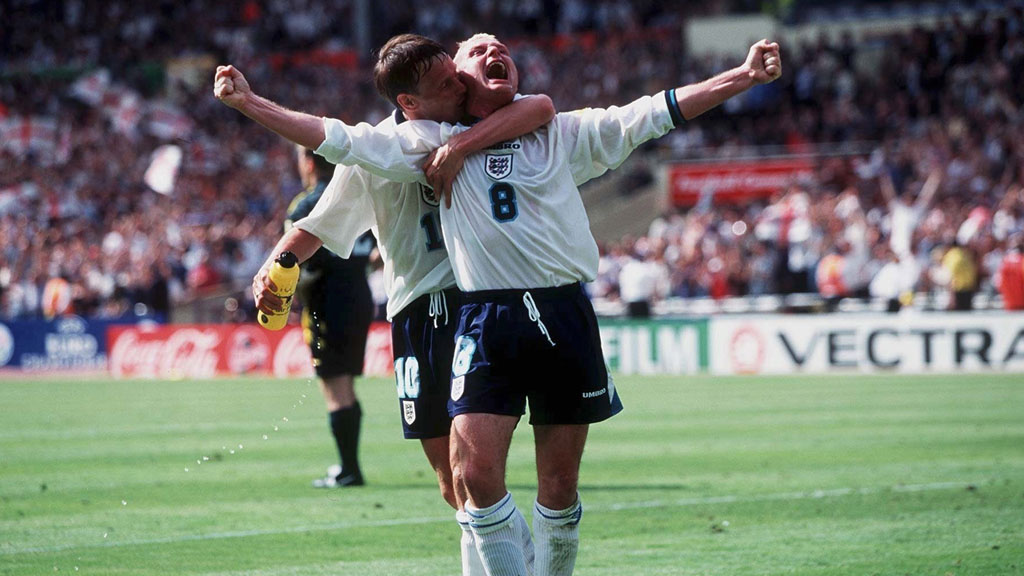Wembley to host all-German Champions League final
Bayern Munich and Borussia Dortmund will contest the European Champions League final at England’s home of football later this month. Why can’t the English match their rivals asks Malcolm Boughen.

Remember Euro 96 – that glorious summer of English footballing rapture?
Gazza in his pomp, scoring that wonder goal against Scotland; the SAS combination of Sheringham and Shearer destroying the “total” footballers of Holland as England swept into the quarter finals, where they went on to beat Spain, no less, on penalties.
But remember, too, how that tournament ended – an Oliver Bierhoff golden goal to win the tournament for Germany after they’d knocked out England on penalties in the semi-finals. It was the German fans who ended the tournament singing “Fussball kommt nach Hause”.
As Gary Lineker is reputed to have said: “Football is a simple game: you play for 120 minutes and then the Germans win on penalties.”
Misplaced optimism
It hasn’t been all one-way traffic since then. There was that oft-recalled magical night in Munich in 2001 when a Michael Owen hat-trick enabled England to pull off an astonishing 5-1 win to help the team qualify for the following year’s World Cup in Japan and South Korea.
But, come those finals, the optimism was to prove short-lived.
Despite knocking out Argentina from the “Group of Death” in the first round, England fell at the quarter-finals, as Germany progressed steadily to the final. There they succumbed to England’s conquerors, Brazil, but England’s quarter-final failure was a pattern that has been repeated with monotonous regularity ever since.
And the sense has been that – as the Germans built a stronger team with each tournament – England have slipped relentlessly backwards, toiling through qualification and group games and folding quickly when the going gets tough. Despite the fuss over Frank Lampard’s disallowed “goal” in South Africa in 2010, Germany ultimately strolled to a 4-1 win in the first knockout round.
Last year’s European championships told a familiar story, as England flattered to deceive in the group games, going out to Italy on penalties when it came to sudden death.
Ace of clubs?
But let’s not worry about international football. The club game is what it’s all about. It’s what we spend our money on every week and where our real loyalties lie, isn’t it? And in the Premier League England has the richest, the strongest and the best league in the world, doesn’t it?
Look at Manchester United – three times winners and twice runners-up in the European Champions League and its predecessor, the European Cup. Or Liverpool – five times winners and twice runners-up. Or the current holders – Chelsea. Our club sides are the best in the world, aren’t they? Well, no, they’re not.
First, England’s clubs were forced to bow the knee to the Spanish magicians of Barcelona – who have won the trophy three times in the last six years alone. And now it’s the turn of the “old foe” to stand atop the pinnacle of European club football, as Bayern Munich and Borussia Dortmund contest the showpiece final at Wembley Stadium on Saturday, 25 May.
We can’t say it hasn’t been coming. The decision of Pep Guardiola to resist the lure of Premier League money in favour of the solid achievements of Bayern Munich in January was a signal of the way the wind was blowing.
Like Italian football, the English game has become too much about money and the need to buy instant success from wherever in the world it might be found, rather than following the Spanish and German routes of nurturing young home talent and using that as the foundation for the future.
It’s not too late to change. But there’s little sign of it happening in the near future. Manchester United have dominated the Premier League this year, but even they admit they still have to step up a level to match the German and Spanish champions. And it’ll be Germany, Spain or perhaps most likely the hosts – Brazil – who will win next year’s World Cup.
Oh well, we’ll always have 1966.